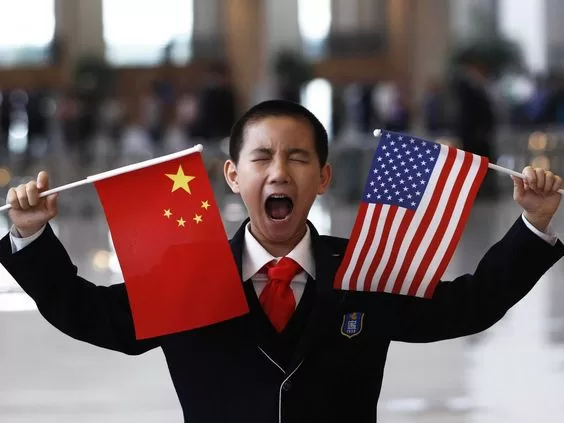China’s Evergrande Group: Navigating Bankruptcy and Its Economic Ripple Effects
In a significant turn of events, China’s once-thriving property giant, Evergrande Group, which once held the esteemed position of the country’s second-largest property developer, has officially filed for bankruptcy in New York. This pivotal move follows a series of tumultuous events, including heavy borrowing, debt defaults in 2021, and a subsequent property crisis that has had far-reaching consequences on China’s economy. Let’s delve into the intricate details of this situation and explore the broader implications it has cast on the economic landscape.
A Precarious Path to Bankruptcy
Evergrande’s journey to bankruptcy can be traced back to its mounting debt crisis in 2021, which sent shockwaves through China’s real estate sector. A sector once hailed as a vital growth engine, contributing up to 30% of the country’s GDP, now found itself in dire straits due to the ramifications of Evergrande’s default. The company’s financial turmoil was exacerbated by Beijing’s crackdown on excessive borrowing by developers, aimed at taming soaring housing prices.
The reverberations of Evergrande’s collapse were felt beyond its own walls. Notably, other major players in China’s real estate landscape, such as Kasia, Fantasia, and Shimao Group, found themselves grappling with defaulting on debts as well. The domino effect extended even further, with Country Garden, another real estate giant, signaling potential debt management measures amid its own cash struggles.
A Web of Economic Impact
The woes of the real estate sector became further entangled with the broader economic slowdown in China. As the sector suffered, so did other facets of the economy. Evergrande, with its sprawling reach encompassing over 1,300 real estate projects and diverse non-real estate ventures like electric vehicles, healthcare, and theme parks, faced a monumental debt load of 2.437 trillion yuan ($340 billion) by the end of last year, roughly equivalent to 2% of China’s GDP.
The company’s financial setback extended to shareholders, with a staggering $81 billion loss reported in 2021 and 2022. In a bid to resuscitate its prospects, Evergrande unveiled a monumental debt restructuring plan, one of China’s largest ever recorded. This plan aimed to alleviate offshore indebtedness, restore operational normalcy, and address ongoing challenges.
Navigating the Road to Recovery
Central to Evergrande’s restructuring plan was the commitment to return to regular operations within the next three years. However, such aspirations came at a hefty price tag, requiring additional financing ranging from $36.4 billion to $43.7 billion. The company laid out its intentions to weather the storm by securing funding. Encouragingly, a glimmer of hope emerged when Dubai-based automobile company NWTN announced a strategic $500 million investment in Evergrande’s electric vehicle division, thereby acquiring a stake of about 28%.
As Evergrande navigates this intricate path to recovery, its journey embodies more than just a corporate turnaround. It underscores the intricate interplay between financial prudence, economic stability, and global cooperation. The Chapter 15 bankruptcy filing has set the stage for a cross-border partnership between US courts, debtors, and international counterparts. The ongoing narrative of Evergrande’s saga serves as a reminder of the nuanced nature of the global economy and the interconnectedness of its components.
Conclusion: A Tale of Resilience and Adaptation
In conclusion, the bankruptcy filing of China’s Evergrande Group stands as a pivotal moment in the trajectory of the country’s real estate sector and its broader economic landscape. The ripples of this event have highlighted the delicate balance between financial prowess and economic stability. Evergrande’s journey, marked by debt challenges and strategic restructuring, underscores the importance of adaptability and resilience in the face of adversity.
Frequently Asked Questions
- What led to Evergrande’s bankruptcy filing? Evergrande’s bankruptcy was triggered by a series of factors, including heavy borrowing, debt defaults, and Beijing’s efforts to curb excessive developer borrowing.
- How did Evergrande’s default impact China’s economy? Evergrande’s default sent shockwaves through China’s real estate sector, contributing to a wider economic slowdown and affecting homeowners and the financial system.
- What is Chapter 15 bankruptcy protection? Chapter 15 bankruptcy enables US courts to manage insolvency cases involving other countries, fostering international cooperation in cross-border bankruptcy proceedings.
- How does Evergrande’s debt restructuring plan aim to alleviate its challenges? Evergrande’s restructuring plan seeks to reduce offshore indebtedness, restore normal operations, and address financial issues through additional funding.
- What does Dubai-based NWTN’s investment signify for Evergrande? NWTN’s strategic investment in Evergrande’s electric vehicle division offers a lifeline, injecting capital and potential growth prospects into the struggling company.
- What led to Evergrande’s initial debt accumulation? Evergrande’s heavy borrowing was fueled by ambitious expansion plans and aggressive investments in various sectors.
- How did Beijing’s crackdown impact China’s property market? Beijing’s crackdown on excessive borrowing aimed to curb skyrocketing housing prices, but it also triggered a chain reaction of debt defaults.
- What does Chapter 15 bankruptcy mean for international cases? Chapter 15 bankruptcy allows for coordination between US courts and foreign courts in cross-border insolvency cases, ensuring efficient resolution.
- How has Evergrande’s bankruptcy affected homeowners in China? Homeowners faced uncertainties as property values fluctuated, impacting their financial security and long-term investments.
- What lessons can other corporations learn from Evergrande’s situation? Evergrande’s story underscores the importance of balanced growth strategies, financial prudence, and adaptability to avoid similar pitfalls.
- How might Evergrande’s recovery impact China’s overall economic trajectory? Evergrande’s successful recovery could contribute to restoring investor confidence and stabilizing China’s real estate and financial sectors.
- What role does international investment play in Evergrande’s turnaround? Foreign investment, like NWTN’s strategic involvement, offers much-needed capital and expertise to bolster Evergrande’s recovery efforts.
- What potential challenges lie ahead for Evergrande during its restructuring? Raising the required additional funding and successfully navigating the complexities of a multi-faceted business will likely pose significant challenges.
- How could Evergrande’s recovery influence similar companies in the real estate sector? A successful restructuring may serve as a model for other struggling real estate firms to adopt strategic measures to regain stability.
- What broader economic implications might arise from Evergrande’s reemergence? Evergrande’s resurgence could have a positive ripple effect on China’s economy, fostering stability and boosting investor confidence.
#ChinaEconomy #EvergrandeBankruptcy #PropertyCrisis #FinancialRestructuring #RealEstateWoes #GlobalEconomicImpact #DebtDefaults #ResilienceInAdversity #CrossBorderBankruptcy #EconomicStability #NWTNInvestment #Adaptability #CorporateTurnaround #HousingMarket #EconomicRipples #Chapter15Protection #FinancialPrudence #ShareholderLoss #GrowthAndAdaptation #EconomicRecovery #ChinaPropertyMarket #DebtChallenges #FinancialRescue #RealEstateIndustry #GlobalCooperation #EconomicAdversity #StrategicInvestment #MarketImpact #EvergrandeSaga #EconomicResilience #FinancialAdaptation #DebtManagement #InternationalPartnership #EconomicNarrative #EconomicInterconnectedness #GlobalFinance #CorporateResurgence #EconomicRevival #SustainableGrowth #RealEstateBubble #EconomicInterplay #FinancialStability #ChinaEconomicOutlook #PropertyMarketImpact #DebtCrisisSolution #InvestmentOpportunity #EconomicDynamics #GlobalFinancialSystem #EconomicReform #DebtRelief #BusinessResilience #MarketRecovery #FinancialRecovery #EconomicFuture #StrategicEconomicPlanning #EconomicChallenges #GlobalInvestment #FinancialHealth #EconomicProspects #EconomicTransformation








